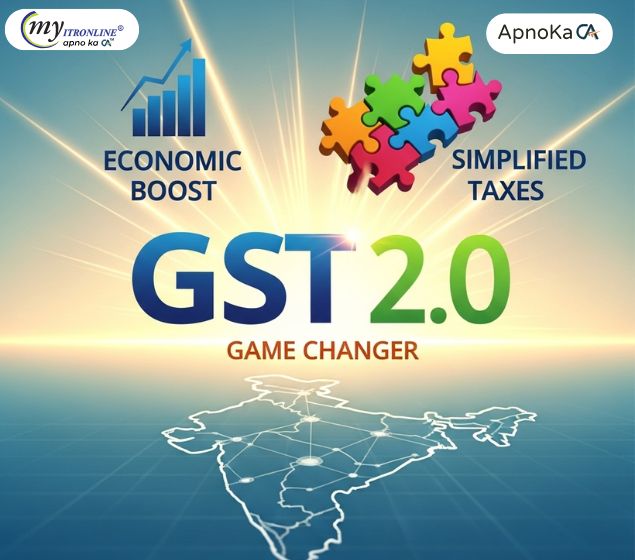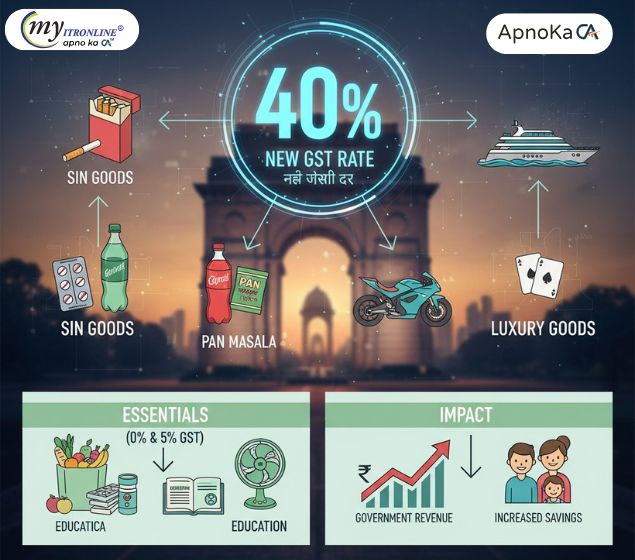# economy
12 posts in `economy` tag

GST 2.0: A Game Changer for India? Simplified Taxes & Economic Boost
This blog post provides a comprehensive overview of India's GST 2.0, implemented on September 22, 2025. It details the key features, including the reduction of tax slabs to 5% and 18% (with a new 40% for luxury/sin goods), lower taxes on essential goods, durables, and automobiles, and increased prices for luxury items. The article identifies beneficiaries like everyday households, the middle class, farmers, healthcare consumers, and MSMEs. It also addresses potential challenges such as revenue shortfall, price pass-through issues, and transition headaches for businesses. Finally, it outlines expected economic ripples and crucial factors to monitor for the reform's success, concluding that GST 2.0 is a bold step towards simplifying life for millions. An appendix with sample MRP comparisons is also included.

Good News for Seniors! 7 New Government Perks for a Better Life
This blog outlines seven new government benefits for senior citizens in India, aimed at improving their quality of life. These perks include expanded health insurance (Ayushman Bharat) for those 70+, free assistive devices (Rashtriya Vayoshri Yojana), increased pension amounts, opportunities for active aging through jobs and social groups (SACRED Portal), support for the "Silver Economy" through startup funding (SAGE portal), a dedicated helpline for safety and protection (Elderline 14567), and improved access to facilities via state action plans. The article also provides a brief guide on how seniors can access these benefits, emphasizing a holistic approach to ensuring respect, health, financial security, and happiness for India's elderly population.

Big News! GST Rate Changes Are Coming Soon
This blog post announces significant changes to Goods and Services Tax (GST) rates in India, set to become effective from September 22, 2025, as per Notification No. 09/2025 – Central Tax (Rate). It provides a clear, simplified table comparing old and new rates for categories like household essentials, packaged food, luxury goods, hospitality, travel, professional consultancy, and IT services. The post highlights the implications for businesses (updating systems for compliance) and consumers (potential price changes), emphasizing the government's aim for clarity and easier compliance. It concludes by advising consultation with tax professionals for specific sector-related queries.

194J vs. 44AD: Tax Scrutiny on India's Content Creators & Consultants
This blog post addresses the increasing tax notices faced by Indian content creators, influencers, and consultants due to a common mismatch: clients deducting TDS under Section 194J while they file income tax returns under Section 44AD. It breaks down the key tax provisions (194J, 44AD, 44ADA), explaining what each means for freelancers and businesses. The article clarifies that a 194J deduction doesn't automatically mandate filing under 44ADA; the crucial factor is whether the profession is listed under Section 44AA. It details potential impacts on tax burden, cash flow, and the need for increased documentation, while also offering actionable steps for creators and consultants to ensure compliance, including clarifying work nature, maintaining records, client communication, cash flow monitoring, and seeking professional tax advice.

Breaking: No Relief in GST, A Big Blow to the Indian Media Industry
This blog post analyzes the impact of the latest GST reforms on the Indian media industry. It highlights how, despite appeals from media and advertising groups, the sector received no significant relief regarding tax parity for digital publications, input tax credit access, or flexible tax payment timing. The article details the approved reforms that benefited other sectors and consumers, contrasting them with the ignored pleas of the media, leading to concerns about worsening the digital divide, liquidity pressure, and hindered cost recovery. It concludes that the lack of targeted reforms poses a major setback for innovation, job creation, and overall growth in the Indian media landscape.

Goods & Services Now Under 40% GST Slab, Effective from 22 September 2025
India is set to implement GST 2.0 from September 22, 2025, introducing a new 40% GST rate for "sin" and luxury goods. This reform simplifies the existing tax structure, lowers GST on essentials, and aims to balance public health with revenue generation. The move will benefit households with reduced costs on necessities, while consumers and industries dealing with luxury and harmful products will face higher taxes.GST 2.0: India Introduces New 40% Tax Slab for Luxury & Sin Goods

States Push for Tough Steps to Stop Profiteering from GST Cuts
The GST Council is set to meet on September 3-4 to review GST 2.0 reforms. States want strict rules to prevent profiteering so that GST rate cuts actually benefit consumers. Key proposals include a temporary anti-profiteering law, consumer complaint platforms, and tighter monitoring of sensitive sectors. Businesses, however, warn about compliance costs and pricing disruptions.

CBDT Simplifies Tax Rules for IFSC Funds: A Major Win for Investors
This blog post breaks down the recent significant amendment made by the CBDT to Rule 21AIA of the Income Tax Rules. It details the removal of sub-rule (4), which previously imposed additional compliance burdens on "specified funds" like retail schemes and ETFs in the IFSC. The post explains how this change aligns tax laws with IFSCA regulations, effectively eliminating dual regulation. The primary impact is simplified compliance, reduced regulatory overlap, and a more attractive investment environment in India's IFSC, ultimately fostering growth in financial hubs like GIFT City.
.jpg)
Goodbye 1961, Hello 2025: India's New Income Tax Act Explained in Simple Terms
This blog post details India's landmark decision to replace the sixty-year-old Income-tax Act, 1961, with the new, simplified Income-tax Act, 2025, which will be effective from April 1, 2026. It breaks down the key changes in simple terms, explaining the reduction in legal complexity, the introduction of a unified "Tax Year," clearer definitions for digital assets, and the move towards faceless, technology-driven tax processes. The post highlights how these changes aim to create a more transparent, efficient, and taxpayer-friendly direct tax system for individuals and businesses across the country.
.jpg)
AY 2025-26 ITR Filings Cross 3.29 Crore; Over 1.13 Crore Already Processed
Despite the ITR filing deadline for AY 2025-26 being extended to September 15, over 3.29 crore returns have already been filed by mid-August, with 1.13 crore processed. This highlights growing tax compliance and the Income Tax Department's processing efficiency.

India's Tax Report: Why a Small Drop is Actually Good News
This blog analyzes India's direct tax collections for FY 2025-26 (as of June 19, 2025). While net collections show a slight dip, the detailed breakdown reveals robust gross collection growth and a significant increase in tax refunds, reflecting enhanced taxpayer services. Positive advance tax figures further signal underlying economic strength and optimistic future expectations, painting a picture of resilience rather than slowdown

How to Access Your PF When You're Unemployed: A Step-by-Step Guide.
This blog post serves as a comprehensive yet easy-to-understand guide for individuals in India facing unemployment and considering Provident Fund (PF) withdrawal. It clearly outlines the two main withdrawal options based on the duration of unemployment (75% after 1 month, 100% after 2 months) and provides a step-by-step walkthrough of the online application process via the EPFO portal. The article meticulously details essential prerequisites like active UAN and updated KYC (Aadhaar, PAN, Bank) and critically explains the tax implications of PF withdrawals, especially for those with less than five years of continuous service. It also covers common reasons for claim rejections and explores alternative financial strategies to consider before tapping into PF. The tone is empathetic and supportive, aiming to empower readers with the knowledge needed to manage their finances during a challenging period.
